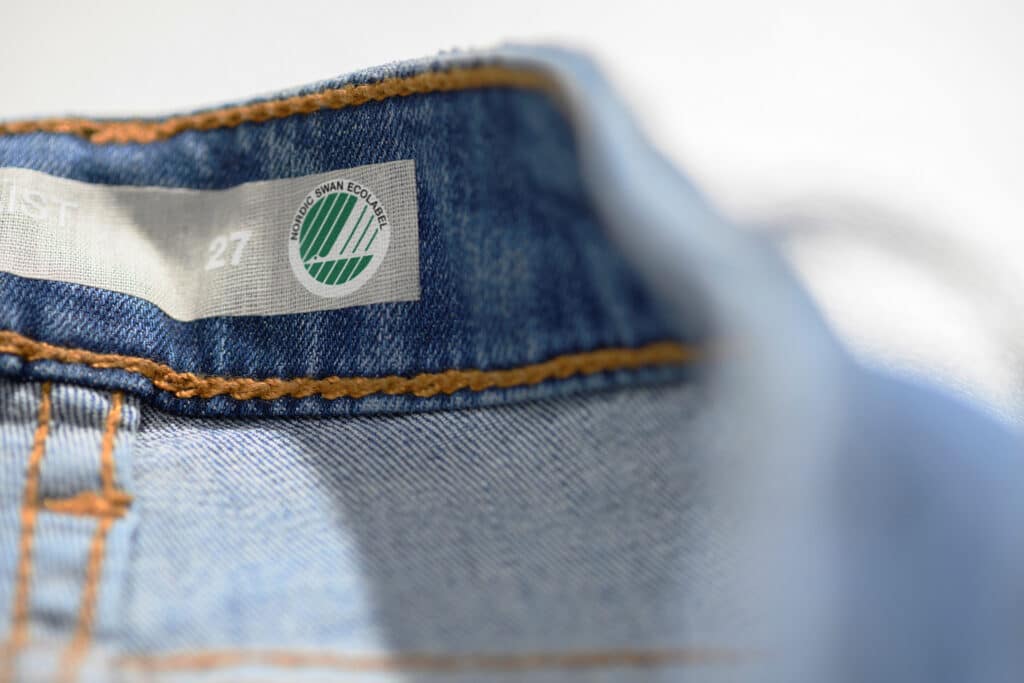The Nordic Swan Ecolabel, the official ecolabel of the Nordic countries, has now launched new requirements for clothing and other textile products. More requirements for product design, increased emphasis on quality, longevity and a ban on dumping surplus clothing are some of the innovations.

The textile industry is a key industry for solving the problems of climate change, nature loss and the spreading of harmful chemicals. According to the EU, the textile industry is the fourth most damaging sector when it comes to climate and the environment. There is a great need to reduce the environmental impact and contribute to a more circular economy, where we recycle materials instead of using and disposing of them.
Industry in urgent need of change
– The Nordic Swan Ecolabel now launches even more ambitious requirements for textile manufacturers because the need for change in the industry is acute. Both European and Norwegian authorities demand more sustainable and circular production of textiles. Now it is important that the industry accepts the challenge and uses existing tools to make the process of changing easier, says Cathrine Pia Lund, CEO of the Nordic Swan Ecolabel in Norway.
More detailed requirements for product design
– More and more people want to make choices with less impact on the environment, and the best choice is of course to reduce consumption. But once you are going to make a purchase, it is important to choose well. We are now strengthening the requirements for product design and production process in order to increase quality and facilitate circular economy for the textile industry, says Anne-Grethe Henriksen, marketing and communications manager at the Nordic Swan Ecolabel in Norway.
First with requirements for microplastics
Another novelty is that manufacturers now have to measure how much microplastic is spread from synthetic textiles. This must be measured with a standardized test-method and we encourage the result to be reported to the Microfibre Consortium with a goal of setting a limit value over time. According to Ecotextile news, the Nordic Swan Ecolabel is the first labelling scheme that sets requirements for microplastics.
Textile fibres must be organic, recycled or bio-based
Cotton used in Nordic Swan Ecolabelled clothing must be 100 percent organic or recycled. For workwear, separate requirements apply. Synthetic fibres must either be recycled or made from renewable raw materials.
No burning and dumping of unsold clothes
The revised requirements for the Nordic Swan Ecolabel do not allow burning or dumping of unsold clothes, and manufacturers must also report to the ecolabel what they do with the surplus products.
Working environment: Must comply with ILO conventions
The production sites for Nordic Swan Ecolabelled textiles must comply with the ILO (United Nations International Labour Organization) conventions which, among other things, prohibit forced labour, child labour and discrimination and which facilitate reasonable wages and working hours. The Nordic Swan Ecolabel also goes on inspection visits to all production sites, no matter where they are situated in the world.
Industry invited to webinar
Do you want to know more about the new requirements? The Nordic Swan Ecolabel invites the industry to a webinar on the requirements and certification process for the Nordic region’s official ecolabel.
Webinar for brand owners and retailers will be held on 15 June – and webinars for manufacturers on 17 and 21 June.
The Nordic Swan Ecolabel
The Nordic Swan Ecolabel is the official ecolabel of all the Nordic countries: Iceland, Norway, Sweden, Danmark and Finland. It works to reduce the environmental impact from production and consumption – and to make it easy for consumers and professional buyers to choose the environmentally best goods and services.• Sets strict environmental requirements in all relevant phases of a product’s life cycle.
The Nordic Swan Ecolabel…
- Sets strict requirements for chemicals used in ecolabelled products
- Tightens requirements for goods and services regularly to create sustainable development
- Certifies and verifies that all requirements are met before a product is approved
- Certifies 55 different product groups counting more than 200 different product types
- Is very well known in the Nordic populations with aided awareness of 93 %
Nordic Swan Ecolabelled clothing and textiles must:
- Use fibres that are either organic, recycled or made of renewable raw materials
- Comply with the UN conventions on labour rights (ILO)
- Test the quality of the fabric, including shrinkage/stretching, colour fastness and durability.
- Meet comprehensive requirements for all chemicals used in textile production. Among other things, there are strict requirements regarding substances that are carcinogenic, or that can damage our reproductive ability or genetic material. Flame retardants, fluorides and antibacterial additives, including nanoparticles, are banned.
- Be produced with a minimum of BAT (best available technology) for efficient use of water and energy, and self-produced solar energy in textile production if possible.